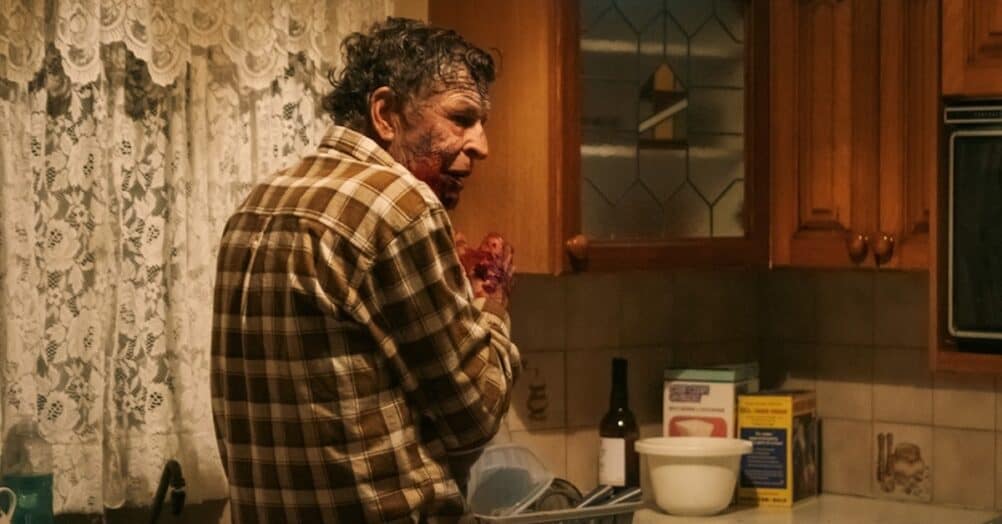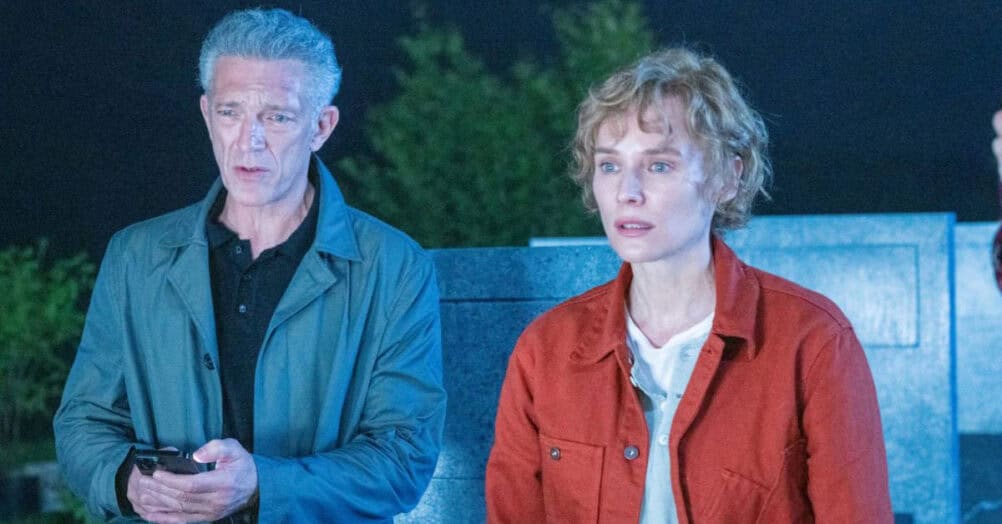Last Updated on July 26, 2021

PLOT: A radio D.J., his producer, and an engineer working out of a church basement in the small town of Pontypool become embroiled in the story of mysterious attacks occurring all over the countryside. While they struggle to keep their listeners informed, it becomes obvious that these attacks are being carried out by an ever-growing number of dazed, confused people. Is this the beginning of an honest-to-goodness zombie epidemic, or is it something much more frightening?

REVIEW: PONTYPOOL is one half of a really cool movie, one-fourth of an okay one, and one-fourth of an impenetrably bizarre one. As is unfortunately the case with so many horror movies nowadays, it starts really strong – building a palpable sense of chaos and fear while utilizing only one location – but can’t keep up the momentum, eventually sputtering to a strange, unsatisfying conclusion. I certainly give it points for how unusual it is, but ultimately that’s what works against it.
“Pontypool”, for those wondering, is the name of a town in Ontario, the town where the flick takes place. It’s an odd title for a horror movie, but I guess it works since PONTYPOOL – the movie – is fascinated by words, and Pontypool is kind of a fascinating word. Grant Mazzy, the “hero” of the story (played with theatrical gusto by Stephen McHattie) is not fascinated by Pontypool. It’s a Siberia where he has been cast off, the end result of apparently pushing the wrong people’s buttons in a big-city market. Now he’s relegated to giving weather updates and chatting about missing cats, while being watched over by producer, Sydney (well-played by Lisa Houle), who gives him a stern talking to whenever he veers off point. (It’s a no-no, for example, to suggest that the town’s deputies might be alcoholics.) Rounding out the little family is Laurel, a petite engineer and war veteran, recently returned from Afghanistan. Laurel is like the daughter caught between squabbling parents – Grant is goofy, mischievous dad, and Sydney is disapproving but tender mom. The dynamic between the three gives PONTYPOOL some added weight, and when things begin to fall apart around them, you’ve already become engaged in their relationships.

And things do indeed begin to fall apart. First, news trickles in about a doctor’s office being besieged by a mob of crazed people. The local weatherman (who, in an amusing revelation, pretends he’s in a helicopter but really just drives around in his car playing chopper sound effects) reports seeing passengers ripped from their cars and torn limb from limb, and is eventually himself attacked. Strange noises begin to emit from unusual sources. When the French-Canadian army apparently quarantines the town – sending the radio station a message demanding they cut off all contact with their listeners – things really start to look down. And then all hell really breaks loose…
PONTYPOOL keeps all of this moving at a quick and realistic pace. And though it’s based on a novel, it has the look, feel, and even structure of a three-act play. Props must be given to director Bruce McDonald and screenwriter Tony Burgess (who also wrote the book) for keeping the proceedings tense and compelling, given the fact that we rarely ever leave the basement of the church. And as neither the audience nor Grant ever see the events being described, sometimes it feels – to us and him – like this is just one big hoax, akin to Orson Welles’ infamous “War of the Worlds” radio play.
I hope it’s not spoiling anything to say it’s not a hoax. In fact, it’s when PONTYPOOL attempts to explain the epidemic that the film goes off the rails. It turns out the infection is spread not by blood or bite, but by the English language itself. A potentially fascinating concept, PONTYPOOL scrambles to explain this phenomenon with the introduction of an excitable doctor who visits the station, but the character’s theories come out in such a flurry of half-cocked vagaries that we’re taken out of the situation just as were were further becoming immersed in it. And when the characters figure out a unique way (putting it mildly) to combat the problem, the movie falls into an even stranger mix of paranoid fantasy and theater of the absurd. By design, the performances become more hysterical as well, with McHattie leading the way in a bug-eyed, maniacal tour-de-force of crazy. It’s a sight to see, but I was deflated that the film had taken this turn into WTF?! territory, never to look back.
PONTYPOOL, at the end of the day, wants to be more of an intellectual exercise – a mediation on communication and the power of language – than just a silly old horror movie. But the problem is, it’s when its just being straight-forward and creepy that it really works. All the rest comes off as pretentious noise.
6/10
















Follow the JOBLO MOVIE NETWORK
Follow us on YOUTUBE
Follow ARROW IN THE HEAD
Follow AITH on YOUTUBE